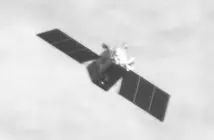
Written by staff writer.
Malaysia is eyeing a larger role in the global space sector and is beginning to implement the policy and physical infrastructure to make it happen.
Historically, the country’s space sector has flown under the radar. However, a Malaysian astronaut travelled aboard Soyuz TMA-11 with the Expedition 16 crew in 2007, and Malaysia has developed and launched over a dozen satellites.
On the ground, Malaysia’s existing infrastructure includes satellite assembly and testing facilities, observatories, data reception facilities, and mission control ground stations.
However, the Malaysian government wants to boost the country’s role in the space sector and become a more competitive participant. The government says developing a sustainable space sector ecosystem will contribute approximately 10 billion ringgits (AUD3.25 billion) to the country’s gross domestic product and generate around 5,000 jobs.
Last year, the government signed a memorandum of understanding (MOU) with the Chinese National Space Administration and the Japanese Aerospace Exploration Agency. It also had discussions with Italy, Türkiye, and the United Arab Emirates concerning space sector collaborations.
Malaysia’s Ministry of Science, Technology, and Innovation has recently developed the National Space Policy 2030 document that sets a prospective agenda for space technologies, infrastructure, and applications covering navigation, communication, and remote sensing.
The country has also established a research and development hub in space policy and law. It is making the facility available to ASEAN members to encourage space law capacity building in the region.
There is also a push to build a launch site in Malaysia, with the Sabah state government interested in hosting it. In June 2023, Sabah signed a memorandum of understanding with a Ukrainian firm for a feasibility study. Malaysia is home to around 60 public and private entities involved in the space sector, and several have also shown interest in developing launch sites, primarily through joint ventures with local or international partners.
The Malaysian government supports the launch site proposal. Late last year, its space agency, the National Space Committee, also endorsed a feasibility study.
However, some work remains to be done, including establishing the appropriate policy and legislative framework to support a robust local space sector. Malaysia has signed and ratified the UN Outer Space Treaty. However, the country is yet to ratify the seminal Treaty on Principles Governing the Activities of States in the Exploration and Use of Outer Space, including the Moon and Other Celestial Bodies. It is also yet to ratify the Agreement on the Rescue of Astronauts, the Return of Astronauts, and the Return of Objects Launched into Outer Space. The government says it is now working to ratify these two treaties.
In addition, Malaysia is not a signatory to the Convention on International Liability for Damage Caused by Space Objects; the Convention on Registration of Objects Launched into Outer Space; and the Agreement Covering the Activities of States on the Moon and Other Celestial Bodies.
The government says it aims to sign and ratify these three treaties by 2030 and intends to fulfil its international obligations and abide by international agreements.





